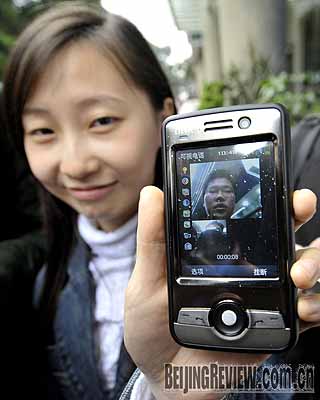|
|
 |
|
3G FEVER: The country's three telecom operators are betting on third-generation mobile services, which let users make video calls and watch TV programs, to increase their revenue (LIU DAWEI) | Over the past year, 3G-a technical term that was new to many Chinese-has gained popularity nationwide. But real 3G mobile phone mania may just be starting in earnest.
The Ministry of Industry and Information Technology (MIIT) on January 7 issued three licenses for third-generation (3G) mobile phone services to major domestic carriers, a long-anticipated move to usher in a faster and fancier wireless age.
China Mobile Ltd., the world's largest wireless phone company by number of subscribers, will operate services based on the domestically developed TD-SCDMA network. Its smaller rivals, China Unicom Ltd. and China Telecom Corp., were granted licenses to deploy 3G networks based on the U.S.-developed WCDMA and Europe's CDMA2000 technology, respectively. A sweeping government-orchestrated reorganization of the three carriers last year paved the way for the final arrival of 3G.
Such networks, which are capable of faster data transmission to support video streaming and conferencing, are already common in the West. But in China, the advent of the cellular technology marks the first time that a country will operate three different 3G networks.
The Chinese Government had been under pressure for dragging its feet in handing out 3G licenses to allow more time for its homegrown TD technology to mature. But now the government's patience has turned out to be worthwhile. Analysts say the rollout of 3G services cannot be more welcome at a time when the country is struggling with an economic downturn. The spending spree on network building would boost the flagging economy, and the trendy 3G services would attract a large number of customers, they said.
The telecom operators have spent billions of dollars on developing their networks, and it is estimated that the government will spend about 280 billion yuan ($41 billion) on 3G networks over the next two years, said Li Yizhong, Minister of the MIIT, at a recent news conference. The government will further strengthen its support for developing the TD standard, born of vigorous innovation efforts, and at the same time foster fair market competition, he said.
|
